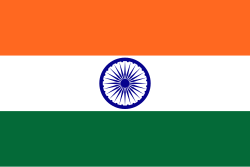Persons of Indian origin

|
|
| Total population | |
|---|---|
|
c. 30.8 million (December 2016) |
|
| Regions with significant populations | |
|
|
4,100,000 |
|
|
4,000,000 |
|
|
3,982,398 |
|
|
3,500,000 |
|
|
2,012,600 |
|
|
2,000,000 |
|
|
1,451,862 |
|
|
1,274,867 |
|
|
1,165,145 |
|
|
1,030,000 |
|
|
994,500 |
|
|
839,504 |
|
|
796,001 |
|
|
700,000 |
|
|
650,000 |
|
|
556,800 |
|
|
468,800 |
|
|
465,000 |
|
|
456,470 |
|
|
400,000 |
|
|
327,000 |
|
|
315,000 |
|
|
250,300 |
|
|
197,301 |
|
|
161,000 |
|
|
156,000 |
|
|
155,178 |
|
|
148,000 |
|
|
120,000 |
| Languages | |
| Languages of India and various languages of the countries they inhabit | |
| Religion | |
|
Predominantly: Hinduism Minorities: |
|
| Related ethnic groups | |
| Indian people | |
Non-resident Indian and person of Indian origin (NRI-PIO), also called Overseas Indians or Indian Diaspora, are people of Indian birth or descent who live outside the Republic of India. As per Ministry of External Affairs there are approximately 30.8 million Indian diaspora residing outside India. India has the largest diaspora population in the world with over 15.6 million according to United Nations Department of Economic and Social Affairs.
Strictly speaking, the term says non-resident refers only to the tax status of a person who, as per section 6 of the Income-tax Act of 1961, has not resided in India for a specified period for the purposes of the Income Tax Act. The rates of income tax are different for persons who are "resident in India" and for NRIs. For the purposes of the Income Tax Act, "residence in India" requires stay in India of at least 182 days in a financial year or 365 days spread out over four consecutive years. According to the act, any Indian citizen who does not meet the criteria as a "resident of India" is a non-resident of India and is treated as NRI for paying income tax.
A Person of Indian Origin (PIO) means a foreign citizen (except a national of Pakistan, Afghanistan, Bangladesh, China, Iran, Bhutan, Sri Lanka and/or Nepal), who:
or
1935 and other territories that became part of India thereafter provided neither was at any time a citizen of any of the aforesaid countries (as referred above);
or
After multiple efforts by leaders across the Indian political spectrum, a pseudo-citizenship scheme was established, the "Overseas Citizenship of India", commonly referred to as the 'OCI card' . The Constitution of India does not permit full dual citizenship. The OCI card is effectively a long-term visa, with restrictions on voting rights and government jobs. The card is available to certain PIOs, and while it affords holders residency and other rights, it does have restrictions, and is not considered to be any type of Indian citizenship from a constitutional perspective.
Coinciding with Prime Minister Narendra Modi’s Australia visit in November 2014, the Indian community in Australia had launched an online campaign, appealing to him to grant dual citizenship to overseas Indians.The petition has also sought granting Indian passports to overseas citizens of Indian heritage with full political and economic rights, granting of convenient voting rights to such dual passport-holding overseas Indians as well as overseas Indians with Indian passports (NRIs), which can be exercised either at the consulate, high commission or embassy premises in their country of residence and through postal or online facilities.
...
Wikipedia
